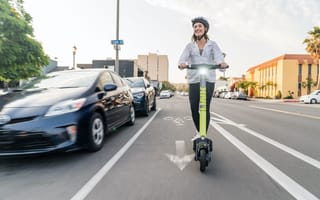
Cambridge-based robotics and micromobility startup Superpedestrian just announced it raised $125 million in fresh funding, which it will use to roll out tech that corrects unsafe e-scooter riding. Comprising both debt and equity capital, the round came courtesy of more than half a dozen prominent investors, including General Catalyst, Spark Capital, Sony Innovation Fund by IGV and Citi’s Citi Impact Fund.
Spun out of MIT in 2013, Superpedestrian aims to develop its e-scooters to be both smart and safe. It debuted its LINK Scooter in 2020, then about a year later acquired Navmatic, a startup that uses GPS positioning to help micromobility operators better track their vehicles in real time. The purchase allowed Superpedestrian to implement this technology on its own Vehicle Intelligence safety system — a combination of AI, sensors and microprocessors that is meant to prevent unsafe riding behavior.
This eventually morphed into what is now known as the Pedestrian Defense system, which is the tech Superpedestrian plans to roll out in light of this recent funding.
“Over the past 9 years, we have developed a unique software platform that addresses the core challenges of electric vehicle fleets. From predictive maintenance and repair automation, to fine grain locationing and curb management, our platform is rich with advanced capabilities that enable safer and more reliable transportation solutions,” founder and CEO Assaf Biderman said in a statement. “With this latest funding round, we are boosting our investment in R&D and scaling up our deployments in micromobility and beyond.”
Meanwhile, this news is coming at an interesting time for the larger micromobility tech space. Transportation giants like Lyft and Uber have launched their own e-scooter offerings, and Lime, an early pioneer in the sector, has raised more than $1 billion in total funding, $170 million of which came as an investment led by Uber back in May of 2020. More recently, European startups Dott and Voi pulled in big rounds of funding of their own, and Voi is reportedly prepping for an IPO.
At the same time, there’s palpable anti-e-bike/scooter sentiment going around, too — at least in the United States. Cities like Chicago, New York and Miami have all gone through their own respective sagas with the technology. Even Boston has gone back and forth on the issue over the years. It all hinges on safety — both of the riders and the pedestrians around them. Cities are wary of the ramifications if folks start riding electric scooters on the sidewalk, or down the wrong way of a street, or at night when they’re drunk.
The technology Superpedestrian relies on could be a viable solution, though. Its Pedestrian Defense system allows e-scooters to better detect and correct unsafe driving behaviors such as aggressively swerving in traffic or stunt riding.
After several months of testing this feature, Superpedestrian plans to use this fresh funding to roll out new scooters equipped with it in 25 cities across the U.S. and Europe this year. It also appears to be in the midst of a hiring spree, with nearly a dozen open tech positions available now.




